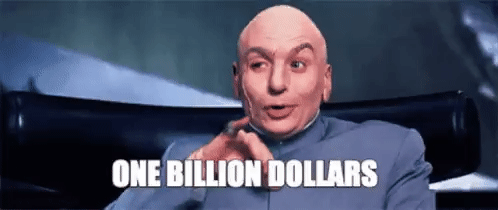So we have another super-jackpot on our hands. The multistate Mega Millions jackpot is expected to be $1.4 Billion by the next drawing later this week.
But that’s only if you take the annuity; if you take the cash payout it amounts to about $800 million. Then Uncle Sam gets his cut which takes you down to about $400 million. Nonetheless, $400 million still buys an awful lot.
So this seems like a good time to discuss the public policy implications of lotteries.
First, lotteries do some good. They help pay for schools, conservation programs, and other public items for which its not always easy to raise funding.
They also exacerbate some social ills; how many people have you seen barely able to pay for groceries drop $20 on a lottery ticket? How many people do you see in bars buy $50 worth of pulltabs at a (huge) loss? The social costs of these peoples’ poor decisions often gets pushed onto society, in the form of more programs, welfare, medical assistance, etc. because they can’t afford them themselves. But they can pay for a lottery ticket.
But there is an aspect of lotteries that always amazes me; lotteries are a tax on people bad at math, and yet they prosper (which speaks volumes about how many people are really bad at math).
Let’s say a state wants to increase funding to build new schools. There are essentially two ways to do that:
They can raise taxes (or the state debt, but most states require a zero debt budget);
They can cut programs elsewhere and divert the savings to the state fund for building schools.
Neither option is particularly popular. There is a cost associated with both of these options that most taxpayers don’t want. In regard to the first option though, you can select who has their taxes raised (wealthy? corporations? everyone?) and in regard to the second you can select what programs get cut (roads? welfare? small business subsidies?). By and large, that’s really the only lattitude there is.
So getting back to our school building option, let’s say we raise taxes on everyone $5. If we have a state with 3 million people, that’s $15 million! Even that small amount would result in outrage! Being forced to pay for other peoples’ kids! Some people have tight budgets! OK. Let’s change it so only the top 10% in earners pay $15 million. That results in a narrow tax increase, but anyone who proposes it ends up losing their jobs when these same taxpayers pay a fraction of that to get rid of the legislators who created this tax.
Which is where the lottery as a means of fundraising is superb. It is a tax on people really bad at math, and the taxed love it. Your odds of winning the jackpot are one in 302 million. For most everybody (and I mean EVERYBODY) who plays, its never going to happen. How big is 302 million? If you started counting now 1 number a second 60/60/24/7/365, you won’t reach 302 million for 10 full years. The odds are in line with flipping a coin 28 times in a row and always turning up heads (seriously, try flipping just 4 heads in a row). You are 300 times more likely to be struck by lightning than win Mega Millions. Our minds just do a terrible job of comprehending how big that number actually is in a relative way. If a ticket costs a $1, its almost the equivalent (but not quite) of just throwing the dollar away.
In addition, people usually buy multiple tickets, thinking it increases their chances (it does, just an infintessimally small amount). What’s interesting to me are the groups that pool their money to buy 100 or so numbers. In actuality, their odds of winning only went up barely anything, but on the offhand chance they do win, they have to split the winnings equally with everyone in the pool. They’re better off buying their own tickets where the odds are roughly the same and they don’t have to split it with anyone.
What would happen if instead of lottery tickets the pool members contributed to a tree in a park? You would physically, actually have a tree in a park, it would provide enjoyment to everyone, but god forbid, who would want to pay for that? Not to mention, people who didn’t pay for it can still enjoy it too. In that sense, we are a selfish people, and the lottery caters specifically to that selfishness.
People who understand the math, don’t play the lottery. They tend to be upper income earners from higher education backgrounds. If you paid attention in math class when you were in middle or high school (or college undergrad statistics), you understand how truly awful your chances of winning a lottery are. Who plays the lottery more frequently? Low income individuals, usually behind in payments, with very little savings and without a college degree, praying for a win to change their life. In that vein, the lottery is about as regressive a tax as you will ever find. And its optional. And people pay for it over, and over, and over again. And they love just having the chance. They’re buying the mirage.
So compare. A $5 tax on everyone? [Booooo!] [Hisssssss!] or $1 for an astronomically small chance at a billion dollars, and you can play as often as you want? YEAH! Put me down for $20!
But I don’t want to end this on a bad note. People really do enjoy playing the lottery. Which is why I want to encourage many of you to watch a movie from last year titled “Jerry and Marge Go Large.” The 60 minutes clip of the real “Jerry and Marge” also appears below. It’s the true story about a guy, very good at math, who discovers a loophole in a state lottery where winnings roll over. He essentially calculates at what point the lottery becomes a net positive position, where the winnings outpace the odds. So even as I sit and argue “Lotteries are a tax on people bad at math,” there are still people out there who prove the exception to the rule.


One last tidbit about the lottery: My numbers are 11, 14, 25, 29, 38 and 8.
PurpleAmerica’s Recommended Stories
I have to give a nod to Matt Yglesias, who kind of revolutionized this format at Vox and now has done it at Substack (check out his newsletter “Slow Boring”). Here is a long form story of how he came to be and what it is like.
One of the things that COVID shutdowns did was greatly expand remote work. Sure, there was some remote work allowed in most places, but people still usually had to go into the office occassionally (or always). COVID changed all that. Businesses learned they can save money on HVAC and rent by reducing their physical footprints. People no longer have to drive into downtowns or office parks. Most businesses allow for remote work where you don’t even have to be in the same city anymore.
Which makes this Washington Post piece an eye opener, even if a little behind the curve. Cities, particularly downtowns, have been slow to adapt to the changes.
A follow up on my earlier post about Kevin McCarthy (“When your enemy is in a hole, give him a shovel.”)
Yup, this piece pretty much reiterates everything I said.
https://www.realclearpolitics.com/articles/2023/01/11/congratulations_to_speaker_kevin_mcfaust_148710.html
PurpleAmerica’s Obscure Fact of the Day
What may be the world’s most visited place (figuratively speaking) that doesn’t exist? That honor belongs to “Null Island.” It is the GIS created place where the Equator meets the Prime Meridian (0 degrees latitude, 0 degrees longitude) in the Atlantic Ocean. The only thing physically there is this buoy.
But whenever there is an error in GIS geo-spatial coding, it defaults to 0,0. Which places you right there. Click the link to find out more.
PurpleAmerica Cultural Criticism Corner
After she won the Golden Globe for Best Actress in “Everything, Everywhere All at Once,” I’ve just been reflecting on what a great actress Michelle Yeoh has been in everything. She made a great bond girl in “Tomorrow Never Dies.” She played the prim matriarch in “Crazy Rich Asians.” But without a doubt my favorite has always been “Crouching Tiger, Hidden Dragon.” I love that movie. Here, with Zhang Ziyi for 5 minutes and 54 seconds, is the greatest martial arts swordfight scene put to film.
The movie is full of iconic scenes like this. If you have never seen it, watch it now.
Rest in Peace Jeff Beck. One of the finest guitarists of all time, he recorded this guitar blues/gospel with Rod Stewart in the 80s and it has been a favorite of mine for years.
Outstanding Tweet
In “Breaking Bad,” Bob Odenkirk’s character, Saul Goodman, trying to prove people will believe anything if it was said with conviction, told Walter White he once convinced a girl he was Kevin Costner and she believed it. In the first season of his sequel/prequel “Better Call Saul,” we see the event to which he was referring.
So it was serendipitous when Kevin Costner edged out Bob Odenkirk for Best Actor in a Television Series at the Golden Globes Tuesday night. Better Call Saul’s Response?
Parting Thoughts
Finally, guilty pleasure- I’m a BattleBots fan. It kind of started when my boy didn’t show much interest in sports but really took to STEM. To help encourage him about engineering, we started watching BattleBots and we had regular conversations about designs, strengths and weaknesses of each bot and so on. Its been something of which we’ve bonded over the years. Anyway, this week, our favorite bot from last year (Blip) is facing probably the best bot of the last few years (End Game). If you want to watch some fun stuff, turn on BattleBots this week.


Let me know what you think of the page. Please share and comment!









